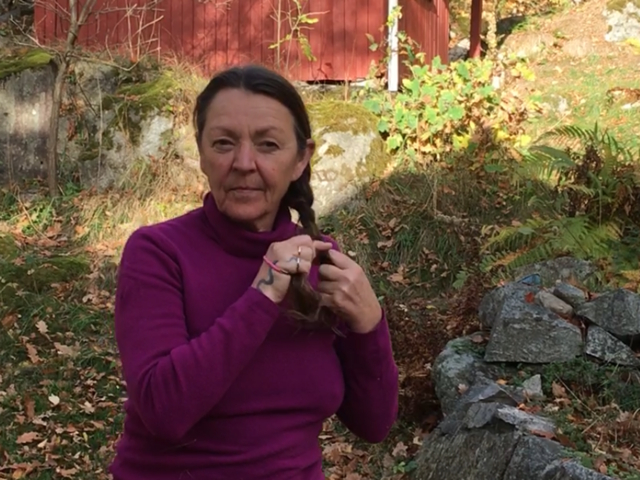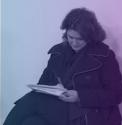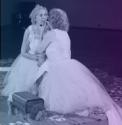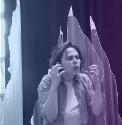Days like these
My husband brings me a little red tray. On it sits a coffeemaker, a cup and the bottom part of a bun. I made the bun earlier, froze it, and brought it out to the woods with us. Now after a trip in the toaster it drips with good butter, and even more from the deep brown, fat, luxurious goat cheese, melting and dripping onto my hands.
My hands, my working hands, now find themselves in the cabin out in the woods. Here are these two small rooms. Here is the desk where I sit facing the window. Next to me is an old refrigerator, he cries when we open him, and sighs when we close him. There is no chance of getting a cold beer without anyone noticing.
Behind me there are the two bunk beds we put up when the children were small. Now their children sleep there. Sometimes. I am alone here now. It is only April. It is cold in this summer place. The heater is on. That is odd. I am usually not here much in the month of April either so I am an odd inhabitant too.
Usually we are rehearsing at this time of year. For the summer performance at the festival. Sometimes it feels as though the whole of spring comes and goes without me noticing.
Outside, it is raining. Good rain. As the poet Tu Fu said:
A good rain knows when to rain
For example: In spring to take care of the seeds
Good rain chooses a mild night with a soft breeze
Good rain waters the earth while we sleep
Good rain falls tonight from black clouds
Over a lonely lantern on a riverboat
The sunshine is wet and red tomorrow morning
The green will start tomorrow afternoon
(Freely translated into English from Georg Johannesen`s Norwegian translation)
The green has begun here.
The wood is dry. I had a fire going some weeks ago when I had to watch the fire for the five hours it took to burn old building materials and other debris behind the shed. The slow process of watching and nurturing the fire made me slow down too. To a meditative, almost hypnotic trance. I, who am not that good at being still. Good practice, this. These days.
I was forced out of that state when some nearby tufts of grass caught fire, and I fetched one of the standby buckets of water to extinguish the fire. I accidentally dropped my rake in the fire, and when I re-discovered it, there was a scar along the handle, a deep brown, almost black, scar. An accident? A scar? Or a memory? As my son always asked when he broke or ruined something as a child. Accident as memory, maybe.
The raisin bun is already nestling in my stomach. I press down the plunger. The coffee smells good.
It is Monday morning. Usually my Mondays are very busy. At the theatre fifteen to twenty people meet around the long table for the Monday Meeting. To share what we did last week, and talk about what the forthcoming week will bring. Our meeting follows a set discipline and schedule. There is a leader, and then we take turns to write up the minutes from the meeting. It is a long and well established routine.
Now, when we get to the item about new enquiries, it is almost quiet. Nothing much from the outside world. The outside world as we know it has become quieter.
I have work. For some time now I have been connected to a resource Centre, where people who have suffered from drug abuse, addictions of various kinds, mental illness, have a place of their own. There is a creative workshop, a car and bike workshop, a carpentry workshop, and a music and theatre workshop. Professional people work there, leading the institution.
Over the years I have picked up a trick or two from theatre and music, and as this Centre considered these skills important, even essential in the daily lives of the members, I started to work there. They had lost my predecessors, with whom they had made two performances, and they wanted to carry on. Even more in days like these, they truly need to have a place to go, work to be done, some challenges to face.
We put together a programme of music, poems and small numbers and presented it to a packed house during the Vinterscenen; it worked out well. My actors and musicians, as I like to call them, played the roles of city cleaners, the roles of angels, the roles of themselves. After the last song, the roof lifted and they flew. Not really, but they were ecstatic, and I was so proud of them. I, who cannot conduct, had conducted them all along, to keep in rhythm, and remember what to do. I also had a gigantic poster I could lift up if they forgot the order we had decided. There were people on that cramped little stage who had never before dared to raise their voices in public, and who now stood in the front row, declaiming poetry, singing solo, filling their shoes all the way.
My face was red, I sweated. When did you learn to conduct, my husband asked me after the show. I never did, I answered.
The coffee is good. From the window I look straight into a massive rock wall, I imagine it to be from the Ice Age. It is called a heller in Norwegian, and often wandering people found refuge under the heller as it slopes inwards at the bottom and then creates a dry place where you can light your fire, and be protected from the weather.
I often think about safe places, shelters, refuges, nests. In a more metaphorical sense. The world is not always a safe place. In the Chinese horoscope I am a goat, and goats like their corners. Where do we go now?
Corners: growing up in a big family, it was not so easy to find a space or place of your own. I was fond of reading, with my nose in a book it was also legitimate not to talk or take part. There was a lot of noise at home. Inside a book it was quieter. Under my mother’s workbench was a perfect place for one person. Crawling underneath, my knees up, twisting around to allow some light to come in. If I kept very still they would forget me. I liked to be part and apart. I can recognize the same pattern in the improvisations around performances too. Once I hid in another room, and I must have grown tired and gone to sleep, I woke up hearing everybody shouting my name, - from outside, in the fields.
The amount of hugs and embraces that I received when they found me on the couch in the living room surprised me. An extraordinary amount of love for taking a quiet nap.
Norwegians drink a lot of coffee. In the past, a lot of not so good coffee, where the quantity made up for the lack of quality. Coffee and cigarettes were called the housewives’ drugs. Now there is, as we know, a whole coffee industry and culture of another kind. Since I have stopped smoking, I drink less and much better coffee. My son swears by instant coffee in big mugs as often and wherever he can. He also enjoys an ample amount of cigarettes.
A honeysuckle plant is crawling up the wall and almost slides inside the cabin. It produces yellow flowers later in spring. The honeysuckle can cover the whole wall, can grow up another tree, can cover the ground. It grows wild here. After all we are in the woods. An uncultivated wood. When a tree falls it just lies there. We only chop it up if it obstructs the path, otherwise we leave it.
The green outside is intense, so beautiful that I become melancholic. This beauty. This green foliage. Huge oaks surround us, interspersed with tall birch, linden trees, aspens and black alders. Some wild cherry trees are just about to sprout. The cold spring holds them back, and prolongs the blossoming. Some garden trees that have gone wild also grow here, I do not know their names. A wild apple tree sits right outside my cabin door. I would like to know the names of the unknown, know what is around me. The trees are thirty to forty metres high.
Me, I am shrinking. I have lost a centimetre or two, and I am now going downwards to 165 centimetres. Standing under the oaks gives me another perspective.
Once when I was younger I was summoned for a health check. There was a health truck driving around Norway, surveying the health of fifty year olds. There was a thick questionnaire, blood samples were taken, blood pressure was recorded, at the end only weight and height needed to be measured. I am, or rather I was, 167 centimetres. I told her so. ‘Let us see’, she said rather curtly and measured me. ‘Madam, you are 166 centimetres’, the health lady said. ‘I am not’, I said, and strangely enough, I could feel myself getting angry.
‘I am 167 centimetres!’ I repeated.’ Well, Madam, we can measure you again’. She did. I stretched myself as much as possible, but she said, ‘You are 166 centimetres’. ‘This has to be wrong’, I said, agitated, I could feel tears coming to my eyes, so I had to look away. ‘Madam’, she said, ‘we can measure you as many times as you like, you are, and will be 166 centimetres’. I excused myself and left that silly health truck. Not only did I waste a lot of my precious time there, they stole my centimetres too. I was offended, I think I still am. Now I do not dare do any more measuring, I might have lost another one.
There is a trail down to the sea, or fjord rather. For some reason it is called the Ormerfjorden, The Fjord of Snakes, and for decades my family have scared each other shouting: Watch out! Orm! Snake! All newcomers are told to wear wellingtons and stamp their feet to scare the snakes. There are snakes and there are snakes. Only the Viper is dangerous.
Sometimes we forget, as I did the other day. I had forgotten both to be afraid and to wear wellingtons, and as we rounded the rock wall I saw a huge snake of one to one and a half metres, and so fat! It was a Viper, and it looked so drowsy, probably just emerging from hibernation. It moved so slowly in the sun that I forgot to be afraid, and became fascinated instead. I could see the characteristic, yellow crisscross band, could see the snake, up close!
Every day since, we have looked for him or her in the same spot, but have only met one of its children, a little one, nothing to be worried about. Vipers are protected, and are not to be harmed, scarce, as they are.
Often when I am in the woods, I rehearse texts. Our rehearsals should have started already in these days, rehearsals for the summer performance Herøya 43, a performance about the Allied Forces bombing our industrial plant at Herøya here in Porsgrunn in 1943.
There is no need to rehearse now. The performance will probably take place next year. However, we did an online reading of the complete script that Tor Arne, the director, has written, all twenty of us. We were close, in a completely new, attentive and weird way. Days like these. The discipline demonstrated to make this reading coherent and precise was impressive. It was as though we were all circulating in orbit, speaking to each other in a vast space.
Are we speaking to each other in a vast space? Anyhow?
55 people were killed in the bombing. One of the lines in the script goes:
” After all they took care to bomb on a Saturday, when there were fewer people at work “.
When I wake up in the night, I start to rehearse text for a performance. Often I am about to travel somewhere, and need to remember the performance in a particular language: Norwegian, English, Spanish. The structure, the melody, the rhythm in the different languages, they are all so different, yet alike. I have become fond of changing languages, changing places, changing surroundings, grown to look forward to my next destination. To my next meeting place.
Not during days like these. My husband asks if I am not becoming more wakeful with these night rehearsals. On the contrary, I answer, I find them relaxing. When thinking goes on in the brain, the body slows down. This might be good for sleeping, but not good for performance. I do need to know the texts by heart in order to be as swift and fluid as possible on stage.
I turn up the heater in the cabin, in my own room, this room of my own. I have my jacket on, and I do feel I have myself on. Things are a bit simpler and more straight forward in the woods. Rougher clothes, wool, usually layer upon layer. Thick shoes or wellingtons. My longest plane ride ever was to Wellington. As it was cloudy and overcast, the plane we should have taken from Oslo to Copenhagen was late, and we missed the connecting plane. We slept in a forgettable hotel and started again next morning. Flew to Bangkok, was there perhaps a little over half way, and flew into Auckland and then down to Wellington.
I left Norway on a Wednesday and I arrived in Wellington on Saturday morning for Magdalena Aotearoa. On the other side of the world, and it felt like coming home to the Western part of Norway where I come from; green hills, deep greenish- blue fjords, sheep everywhere. Sometimes we travel very far to come home.
My interest in nature, birds and animals has grown over the years. A friend says it is a definite sign of getting old. I replied in that case I have been old for a decade already.
My father was a hunter. My mother and father were a passionate fisherman and woman. I grew up with dead animals hanging upside down in the cellar. Whole big birds, feathers and all in the freezer. A whole freezer filled only with fish. Once my mother caught a common ling. It weighed more than twenty kilos. She made more than 500 fishcakes. And never a fishcake again after that. Picking berries, potatoes, apples, plums and pears. Always collecting food. Storing it up for the long dark, cold winter. I have inherited this need to have food and essential items with me. In my knapsack there should always be enough to stay out on a cold starry night or two. My friends mock me. I let them.
My father worked down on the docks. Sometimes when he came home his bag was bulgy and heavy. He had been onboard the ships unloading, buying booze and bacon. My mother was also pleased. Bacon was luxury food.
Nature was something much more concrete and direct for them. I do notice whether there will be a lot of blueberries or not, but not because they are a necessary source of food. Nature was economy first to my parents. Then, if they caught, picked or plucked their food, they could relax and notice the beauty afterwards. I think there will be a lot of blueberries this summer. I see them shaping into fruit now. I look more closely these days. I have the gene dormant in me. I find it important for another reason to harvest the abundance offered. There is also a political side to this. Should we become so rich and indifferent that we pass by meadows of mushrooms, blueberry fields, wild raspberries? I can feel my mother`s eyes on me.
I saw a squirrel. This elegant, little brown creature. Those shades of brown, the smooth fur and the shiny eyes, I like them a lot. They have been my favourite little animals since childhood. Imagine just walking up and down the tree trunks, flying over to the other tree so easy-peasy.
Once I was out walking with my grandmother, I must have been four or five years old. On our way home we passed through our neighbor`s farm. In the courtyard they were cutting down a big old pine tree. My grandmother held me tight, to keep me safe from the falling tree. It fell and fell and landed with a swush. Dust and debris flew all around us. The farmer went closer to the tree and as he approached he let out: ‘Well, I’ll be damned!’, and beckoned to us to come closer. There been a nest in the tree, we saw three small squirrel babies trying to find their way out from under the branches. They seemed unharmed, but frightened. Where was their mother? I did not think about a father.
In the other cabin my husband is writing. It is warmer there; he sits in the kitchen, which we always keep warm.
Sometimes when, for some reason, we are here off season, hiding, fleeing, seeking refuge, from difficult days, difficult decisions, difficult thoughts, the only place where it is comfortable enough is the kitchen. Even if we light a fire in the living room, it takes too long for it to reach a temperature where you can sit and work.
We have coats and wool hats on indoors. When we go to bed in the cabin where I am working, it is so cold that I keep my hat on. I keep my long johns on too, my woolen sweater as well. Layers and layers of duvets and blankets on the bed. And we are here because we want to be. We do not have to be. It is a strange kind of luxury. Even on days like these.
My husband writes about his mother. Her biography. She was a writer. She was a feminist pioneer and essential in establishing the feminist magazine Sirene in the early seventies. This place was also her refuge, her nest and shelter. I am indebted to her. My mother in law, Bjørg Vik was her name, was a playwright too. I directed one of her plays called The Trip to Venice, which she wrote here. The play is about an old couple who had been great travelers in their younger days, but now were obliged to stay at home, because of age, health and lack of money. They then invented a tradition that every Saturday they would go for a trip, in their own living room. Up in the mountains, to a Roman bath, to Venice, or to a nudist beach in Germany. Knowledge about the destination, food and drinks from the area, and clothing appropriate for the occasion were all necessary props. Bjørg Vik described her play, inspired by this couple, as a melancholic comedy.
Anne-Sophie Erichsen and Lars Vik (from our theatre, Grenland Friteater), played the couple and they were joined by long time freelance collaborators, Lena Barth Aarstad and Joakim Dan Jørgensen. When we told Bjørg that we were going to put on her play she started to cry and said she had been waiting for this for more than twenty five years!
Writing out here was rare for her, an exception to the rule. Usually when she came here, she had delivered a draft text to the publishers, usually of short stories. Having done that, she could have a long summer holiday here, before the text came back to her in the early autumn for proof reading and small changes. She had two long summer months here, with her children, who were on holiday from school.
It was at Easter 1968 that Bjørg and her husband Hans Jørgen went to the races. Something they had never done before, and never did again. There they met a man who said he had a place in the woods, by the fjord, for sale. He was going to put an ad in the paper the following week. Please do not, said the couple, let us have a look at it first. They almost did not find it, hidden in the woods as it is. The rest is history. Here they dug, set fires, chopped, sawed, building their place with their own hands. Having been a bricklayer before he became an architect, he was handy, and eager to use his body for manual work. I think of how effective, how helpful hard manual work can be.
So it is in days like these. We have employed a professional tree doctor to take down a dozen of the tall trees down in the swamp, the former ice-pond. We moved the logs away, to places where they can dry a little before we chop them up. Masses of heavy logs to be moved. Hard, heavy, dirty work. The upper arms and the back hurt. It is so hard that I grunt. And grunt again. A sweet pain.
Back at the cabin writing. I look out at the same rock wall as she did. As the ice workers did. As the hunters before them. We still see the remains of snares put out to catch the fox in order to sell its fur probably. We have met badgers, deer, moose, and our neighbor saw a lynx. Scary, I think, I who prefer the squirrels. We have all looked at the same rock wall, the same sky, the same trees. Behind my cabin is an enormous linden tree. It has started to lean over, and we were afraid it would fall and the roots would destroy the cabin, just take the whole little hut with it. But the tree doctor said the tree is safe. So are we. At least from falling trees. In days like these.
The honeysuckle looks as though it is going to cross my window, it virtually grows while I am looking at it. Maybe my daughter Anna would like a cutting? She has truly green fingers.
Bjørg needed to relax and wind down when she was here. So she painted. I look at a watering can that has undergone several changes, probably from stainless steel to bright yellow to dark brown. Many objects and pieces of furniture have changed color out here, she must have found peace and meditation in that particular kind of work. Yesterday when I was looking for some screws in the tool shed, I spotted an old Luxor lamp. As I am an avid collector of old Scandinavian things like that, I asked my husband if I could have it and replace it with a less fancy one, as this one is a collector`s item. He said yes, and asked whether I realized that it had been repainted? From green to dark blue? I had not, so then there was no point in taking it to town. But I thought of all the hours invested in painting, and then repainting, changing her mind.
That takes me to a text by Lillian Hellman, a text we used in the first performance I took part in. The Play is over – American dreams
“Old paint on canvas, as it ages, sometimes becomes transparent. When that happens, it is possible, in some pictures, to see the original lines; a tree will show through a woman`s dress, a child makes way for a dog, a large boat is no longer on an open sea. That is called pentimento because the painter “repented, changed his mind. Perhaps it would be as well to say that the old conception, replaced by a later choice, is a way of seeing, and then seeing again…”
I have this notion that Bjørg also repainted.
For The Trip to Venice Bjørg won the prestigious Ibsen prize, it toured in Norway and Europe, and was also made for television. I like to know that it gave her great joy in her latter days that we created our version of the play too.
When Bjørg and Hans Jørgen took over the place here, it was a barracks for workmen who were involved in ice production, a huge industry in Norway for a short period of time. Ice production, in ponds near the fjord, was convenient. The sometimes 200 kilo heavy blocks were loaded onto ships to be exported all over the world. This industry took place around a hundred and thirty years ago. Around the end of the last century, Norway was the largest exporter of ice in the world, with more than 500,000 tons of ice. That also meant a lot of work for a lot of people. My father in law collected the old tools and instruments used in this hard manual work of sawing and carrying the ice blocks.
The oldest parts of our cabin belong to those times. Those days. We still see the remains of the ice production in the surrounding landscape.
The ice blocks had to be 60 by 60 centimetres and so clear so you could see through them. The best ice was so transparent that you could read the newspaper through it. The blocks fitted into the old fashioned coolers . They lasted for days. Nowadays I get my small ice cubes to put into my juice from the fridge. The crying fridge.
There is running water here now. 50 years ago they drilled 120 metres down to look for water, spending a fortune to obtain undrinkable salt-water. I can now splurge with water, let the hose run as I brush my teeth outside. The new water arrives in its own pipe line. It seems limitless, the amount. Lots of water, lots of electricity. In Norway these two sources are bound together. Our water is our light.
My coffee is cold. I am cold. It has stopped raining. I sit here and I get older.
The morning meeting on Monday goes much faster when it is digital. I am here in the woods, having the Monday morning meeting. It is weird. To think of the others, in their different habitats, kitchen, offices, gardens. Soon I shall travel back into the city. I shall meet with our composer to discuss the content of a new Stedsans ( Sense of Place) city walk in September. What will be the rules for being together in September? What kind of days will we have?
Tomorrow I shall attend a funeral. An old colleague, who participated in several performances, has died. Lars, my husband, and I have both been invited. The church is big, so we are allowed to be 50 altogether. In the smallest churches there can only be five. Days like these.
Itching to do something not digital, we wrote to the municipality and asked permission for my character, Marthon Danielsen, to take a stroll in the city center, with his broom and spade and wheelbarrow. We were granted permission. He had his fine jacket with the red handkerchief under his workman`s outfit. As it was close to the 1st of May, he cleaned the Park, picked up cigarette stubs and other rubbish, greeted the passers-by and wished them the best of celebrations on International Workers’ Day. He also bought carnations! That he handed out. In Norway they are called nellik, a more friendly term. Marthon is a talkative character, an icebreaker. It was fine to get into conversation with lonely walkers. It was thoughtful to sit there in character, alone, on a stone, drinking a cup of coffee.
 How come the green is so green? Everywhere I look I see green. The house and the cabins are small compared to trees and the rock wall.
How come the green is so green? Everywhere I look I see green. The house and the cabins are small compared to trees and the rock wall.
I paint here too. I painted a red door white. I painted the newest cabin red. It had faded. I also write here. I often come here to write, it is not so difficult to concentrate.
What disturbs me here? A bumblebee colliding with the windowpane? Is the sun shining too brightly through the window? Is there another insect, now inside the cabin, that I need to let out? Is the wind lifting the heavy branches of the cherry tree, now full of white blossoms? Spring has come. Even in these days. Spring has come, and is so beautiful that it hurts my eyes. I shall not close my eyes, anyhow.
Geddy Aniksdal
Porsgrunn, Norway, spring 2020
With thanks to Gilly Adams for English assistance.




